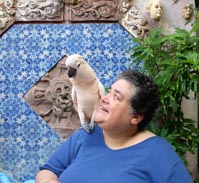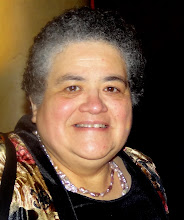
Last June, my husband Yehuda Lev, 82, collapsed. In the months that followed, he has alternated between several week-long sojourns in hospital and living in a nursing home because the nature of his illness makes it impossible for him to be cared for at home. Traditionally, we had hosted a large Pesach Seder, a ritual Passover meal, for as many as 25 people. This year, my daughter and I struggled with our choices: Should we forego our celebration and go to other people’s homes? Should we go ahead and host it without him? Should we have our Seder and connect to him with Skype, an Internet video connection? Finally we decided to do the Seder at his nursing home. It was small; twelve of us—only our extended family and closest friends.
The following is the drash, or commentary I wrote to welcome our guests to the Seder.
For me, Pesach is a holiday laden with memory. I first felt my daughter move within me during my pregnancy on the first night of Passover, 1980. We shared Pesach with Yehuda's mother and stepfather several times, and I have wonderful memories of them on those occasions. Then there all the Seders that we have shared with our friends and family here in Providence as well as the many we shared with friends in California before we moved here: a rich panoply of happy memories.
It is wonderful that in spite of the difficulties of the last year, we were able to be together here in Yehuda’s home away from home, Summit Commons nursing home.
You build a life and you believe that you have some control over it, and then an accident or a sudden illness occurs, and you find that the life you carefully constructed will sweep you along, like a fish in a river, and you have little control over anything. You are left to wonder at the arbitrary nature of life, at the chaos that now rules it, and to pray for the strength to meet the unfamiliar challenges that lurk just out of view.
Mathematicians say that the nature of life is chaos. Unlike many things that they assert, this last year has made me understand this concept. And we, ever human, try to impose our small bit of order over the chaos.
As Henry David Thoreau, said, in Walden,
“Time is but the stream I go a-fishing in. I drink at it; but while I drink I see the sandy bottom and detect how shallow it is. Its thin current slides away, but eternity remains. I would drink deeper; fish in the sky, whose bottom is pebbly with stars.”
As I prepared for the Seder this year, I was thinking about the Israelites who had to leave the familiar oppression of life in Egypt for the great unknown of life in the wilderness: Where would they sleep? Where would they get water? Where would they get wheat to make their bread? What flora and fauna would they find to feed themselves and their children? Slavery was horrid but wandering in the wilds for an indefinite time, which ultimately turned out to be forty years –almost two generations—was terrifying.
"Teach me to bend with life, how to repair what I can repair, how to live with my questions, how to rejoice in Your wonders. When I am faced with events that baffle and astound me, help me to transform my frustration into humility and awe. Teach me to embrace the mystery, G-d. Remind me to enjoy the ride. Thank you. G-d, for this spectacular life."

